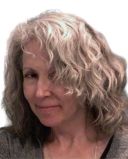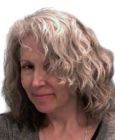“Olga,” I said to my neighbor with tears in my eyes, “I have—breast cancer.”
“So, who doesn’t?!” she said with a wink.
Olga’s comment made my day, reminding me what good company I kept. It momentarily cut through the envy I felt for everyone who appeared healthier than I did, which is to say, everyone.
Unlike most cancer patients, I was used to talking and thinking about cancer. During my training as a psycho-oncologist (a clinical psychologist who specializes in cancer), I used to be one of the envied, bounding around the hospital in my starchy white coat. It was even worse for one of the psychiatry residents; her patient complained that she simply couldn’t cope with seeing the resident’s beautiful face and thick blonde hair everyday (both of which I had noted as well).
Now, here I was, envying not only the pretty women, but everyone else too, especially during chemotherapy. As the flood of hairs fell from my head, I noticed other women’s flowing locks like never before. It is one of life’s great ironies that we share our mortality with every single other person, and yet, when we deal with it in our own lives, it’s the loneliest feeling there is.
The envy even crept into my relationships with other breast cancer patients, wonderful women—usually friends of friends— who spent hours on the phone with me even though we didn’t know each other. I had stage II invasive lobular carcinoma, because of which I subjected myself to a bilateral mastectomy, reconstruction, chemotherapy, and hormone therapy that would likely put me in early menopause. If my new breast cancer friend turned out to have “only” stage I disease, or to need “only” a lumpectomy or no chemo, the inevitable competitiveness set in. How could she know what I was going through when her odds were so much better than mine?
On the other hand, if she turned out to have Stage IIIC, as one new friend did, I felt humbled and guilty. What right did I have to cry, when I still had early stage cancer and my odds for cure were higher?
There were moments when my envy even gave me strength—perhaps the poison made me feel tougher than thou. But more often, what made me feel strong was the way the people around me supported me, helping any way they could, babysitting, offering food, errands, love. I don’t think cancer is a gift (and, if it is, I’d prefer to be directed to the returns counter). But it taught me to appreciate the very people whose health I begrudged. I even had to admit that my envy was usually based on a fallacy. How did I know if my friends and neighbors really were healthy themselves? How did I know what their future held any better than I knew my own? When I was training, a beloved breast surgeon was killed in a car accident in her early fifties. How many of her grieving patients ever expected to outlive her?
Close to the end of my treatment, a woman on a breast cancer discussion board started a thread. “We complain so much here about what’s terrible. How about some examples of positive things that have happened because of your cancer?” she asked.
The posts piled in. One woman whose husband and adult sons took care of her the way she’d once cared for them. Another whose church group instructed her to leave two bins in her driveway during her year-long treatment; every day, the group filled one bin with hot food at dinner time, the other with cold, making sure she never had to cook for herself. Someone made sure to check in on her everyday so she wouldn’t feel alone.
I thought of my own positives. A few had to do with my writing, or my deepening professional insights, as I now learned my field from the inside out. But mostly, they were one testament after another to the people in my life, starting with my husband and sons, parents, mother-in-law, and everyone else. The people whose health I envied, like my friend, Marie, who drove four hours from Maryland just to give me silly gifts, and take my boys to the zoo, so I could relax. Or Beth, who drove me three hours and back so that my family and I could go on vacation without my having to miss my weekly treatments in the city. Or the members of a mail group I belonged to, whom I’d never met in person, who sewed a beautiful quilt to keep me warm during my chemo winter.
My envy didn’t disappear. But it paled in comparison to moments like these, moments of connection to combat my fears of isolation.
One woman’s response to the thread will stay with me always. Her hair was falling off at lightning speed two weeks into chemo. Distraught, she warned her co-workers that she would shave her head that night, and didn’t know how she’d look the next day. When she came into work in the morning, she discovered that her male colleagues had shaved their own heads, in solidarity.
Click here for my book (one of O: The Oprah Magazine's 10 Titles to Pick Up in May; with Foreword by New York Times columnist David Brooks): The House on Crash Corner and Other Unavoidable Calamities—about the sad, hilarious and meaningful ways we deal with the crises in our lives.
Copyright Mindy Greenstein


